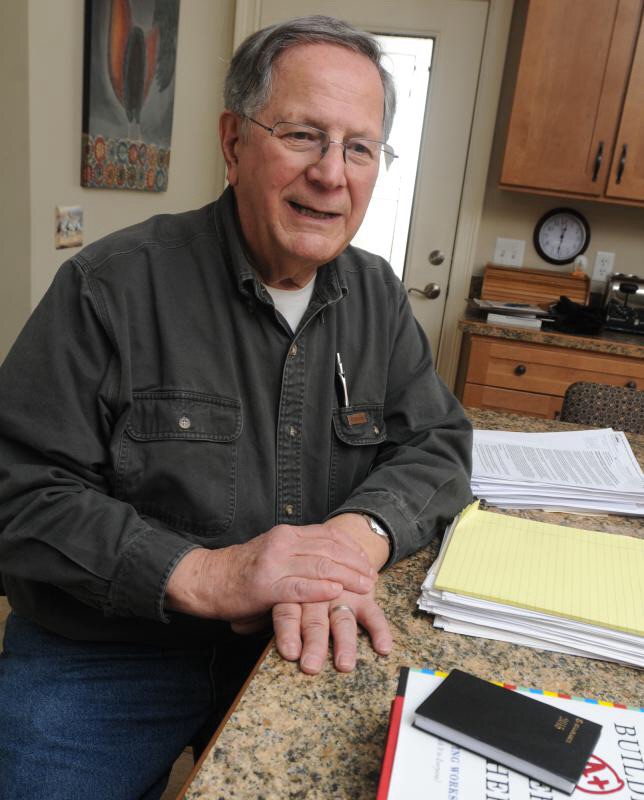by GREG SAULMON
Daily Hampshire Gazette
NORTHAMPTON — A Hampshire Superior Court judge has ruled in favor of a Southampton man seeking information on which Massachusetts schools and districts participated in a 2012 international student assessment study.
Judge Bertha D. Josephson on Friday ordered state education officials to release the information — a list of the 49 schools and districts where students took the 2012 Program for International Student Assessment (PISA) test — within 10 days. The state education department’s argument that the records are covered by the confidentiality exemption to the Massachusetts Public Records Law “defies logic,” Josephson wrote in her decision.
The ruling is the latest development in the fight for public records that James Palermo has waged since April 2014, when he made a verbal request by phone to the Massachusetts Department of Elementary and Secondary Education seeking assistance with filing a request for the information.
Since then, he has been stymied in his efforts to obtain the names of the schools and districts — despite the fact that state Supervisor of Records Shawn A. Williams has twice ordered education officials to turn over the information. Even after Josephson’s ruling, Palermo wrote in an email to the Gazette Sunday, “… it is troubling to realize that the battle may not be over,” because the state may appeal the judge’s decision.
Palermo filed his complaint in Hampshire Superior Court in March 2014, naming the state Department of Elementary and Secondary Education, Commissioner Mitchell D. Chester and Deputy Commissioner Jeffrey R. Wulfson as defendants. Under the state’s Public Records Law, the superior courts and state Supreme Judicial Court have jurisdiction to order a public records custodian to comply with an administrative order to release information.
State education officials, though, have said the U.S. Department of Education’s National Center for Education Statistics — which coordinates participation in the assessment — does not allow the release of information identifying specific schools and districts.
Officials also cited the confidentiality exemption to the state’s Public Records Law, as well as a confidentiality section of the federal Education Science Reform Act of 2002 that states, in part: “The Director shall ensure that all individually identifiable information about students, their academic achievements, their families, and information with respect to individual schools shall remain confidential.”
“There’s no other way to read that,” Assistant Attorney General Andrew M. Batchelor said in arguing the state’s case at an October hearing in Hampshire Superior Court.
Josephson disagreed.
“The names of schools and school districts, standing alone, say nothing whatsoever about any individual student and therefore cannot be considered to hold individual identifying information about a particular student,” she wrote in her decision. “DESE’s position that the confidentiality exemption covers the names of schools and school districts defies logic and a common sense application of the unambiguous language of the statute.”
Palermo “… is entitled to the records he requests without further delay,” she wrote.
Northampton attorneys Thomas A. Miranda and Justin P. Goldberg of Miranda Law Offices represented Palermo in court, taking up the case after the Gazette began reporting on his efforts.
Palermo noted the attorneys’ work in his Sunday email, writing that without them, the decision “would not be possible.”
“I believe they deserve all the credit and I am extremely grateful to them,” he wrote.
Palermo, 74, has said he sought the information because he is conducting research on charter schools — and, he has argued, the information should be accessible to the public because the test results could be used in developing education policy.
“I suspect that so much of the behind the scenes of the education reform movement is influenced by those who want to privatize public education, in order to make profit,” he wrote Sunday, explaining his belief in the importance of transparency from the state.
“I believe decisions about education should be made by objective educators and not politicians,” he wrote.
According to the state education department’s website, “PISA informs national discussions about education as well as provides international comparisons.”
State education officials announced the 2012 PISA results in a February 2014 press release that carried the headline, “Massachusetts Students Score among World Leaders in Assessment of Reading, Mathematics, and Science Literacy.”
The two-hour test was taken between October and November 2012 by a “random, representative sample of more than 1,700” 15-year-old Massachusetts students, according to the press release.
A section of the department’s website about the PISA states that Massachusetts participated in the 2012 assessment “… as its own ‘nation’ along with 70+ actual nations in three subjects based on international teaching and learning frameworks.” Of those participants, Massachusetts ranked fourth in the reading assessment, sixth in the science assessment and ninth in the mathematics assessment.
“Our state, one of 50 in the nation of the United States, established itself as a leader in international education in 2012,” the department’s website reads. “Our results confirmed that Massachusetts did indeed have international teaching and learning standards.”
The PISA assessment — administered every three years since 2000 — is billed as the world’s largest study of international education.
Massachusetts schools were scheduled to participate in the assessment again this year.
Staff writer Dan Crowley contributed reporting.
Greg Saulmon can be reached at [email protected].


